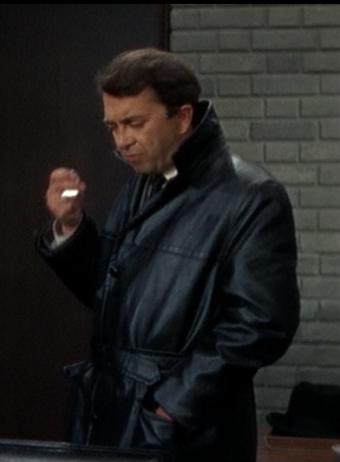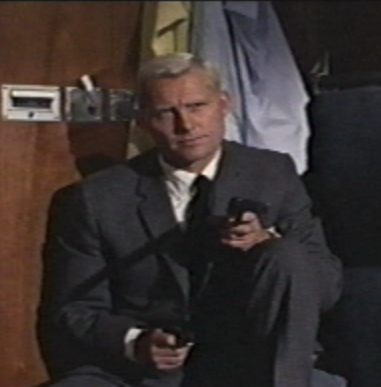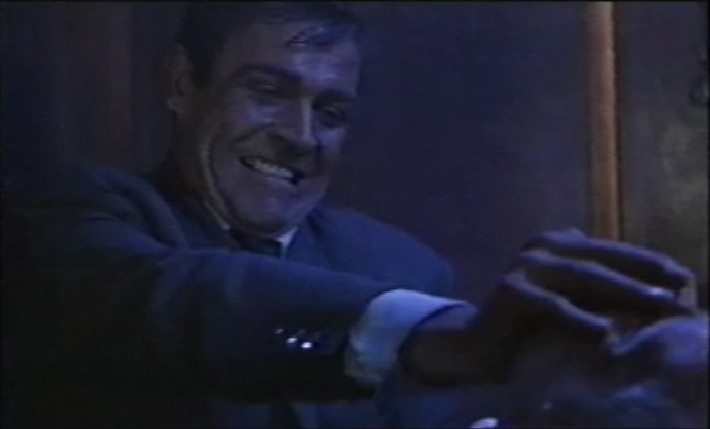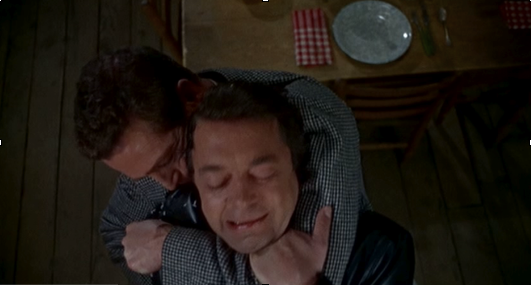Michael Armstrong vs. James Bond
That Arresting Rhythm:
The Murders
One of the most important aspects about the murders is the way the audience feels about who is killed in each film. The sympathy created for Gromek is far greater than that created for Grant. The ultimate depiction of the murders, therefore, seems to depend on how brutal the director wants to be to the victim and how the audience relates to the hero doing the killing. Click on Gromek and Grant to see how their characters differ and then explore the murder sequences below to see how that characterization is used for effect.
The murder sequences in Torn Curtain and From Russia With Love are similar in odd ways and at the same time there are obvious differences pointed out by Hitchcock as anti-Bond elements. Both murders take place in a confined space, both involve strangling and stabbing.
"I don't mind talking. I get a kick out of watching the great James Bond find out what a bloody fool he's been."
In the Bond murder, Grant has seemingly captured Bond, gained the Lektor machine, but pauses, as a good Bond villain, to tell SPECTRE’s entire sinister plot. Bond manages to trick Grant with the promise of fifty gold sovereigns into opening his briefcase from M’s office that then releases tear gas, giving Bond a chance to gain the upper hand. In the course of the struggle, the lights in the train car are knocked out, leaving the scene in a stylized blue light. Bond and Grant then fight for several minutes, taking up the entire room, breaking windows and slamming one another into doors, oblivious of the other passengers on the train, who do not seem to notice the commotion anyway. Grant manages to get behind Bond and pull the secret wire out of his lethal wristwatch but though Bond is being strangled, he retains enough sense to fumble for the dagger hidden in the side of his briefcase, pull it out and stab Grant in the arm. Grant immediately falls to the side and Bond strangles him with his own weapon; Grant falls limp within only a few seconds. The weaker character thus proves, unsurprisingly, to also be the weaker fighter. Bond straightens his tie, gathers up his belongings, and makes a hasty exit with the near-unconscious Tatiana but not before reclaiming his stolen cash from Grant with a witty, “You won’t be needing this, Old Man.”Grant's murder is carried out in relative silence; neither Bond nor Grant call out during the murder but the diegetic noise in the scene is loud and crashing and always underscored by the constant, rhythmic noise of the train. In fact, the noise of the train almost serves as the film’s music since once the murder is completed, the noise becomes quieter, signaling a drop in emotional tension.
"Don't be stupid, I was trained by experts!"
One need only examine Torn Curtain’s murder superficially to see how Hitchcock’s scene works in almost total opposition to the one in From Russia With Love; Hitchcock constructs the scene with a deliberate sense of reality 60. The quickness of Grant’s death, prefaced by the pre-credit sequence where Grant manages to both track and kill his Bond-double in “one minute and fifty-two seconds,” is exactly the kind of action cliché Hitchcock told Truffaut it was his intent was to avoid:
"In every picture somebody gets killed and it goes quickly. They are stabbed or shot and the killer never even stops to look and see whether the victim is really dead or not. And I thought it was time to show that it was very difficult, very painful, and it takes a long time to kill a man". 61
Therefore, Gromek’s murder lasts over four minutes and he is strangled, stabbed, beaten in the knees with a shovel and finally asphyxiated in a gas oven. The difficulty Michael has in committing the murder makes the physicality the audience comes to expect from Paul Newman ironic and unlike Bond with his choreographed fighting, the struggle is long, painful and awkward 62. Gromek's resiliance, unlike that of Grant who falls over within six seconds, further testifies to his complex characterization. It is harder to uncompromisingly kill a round character than a flat one. Furthermore, unlike the special gadgets invented for killing and espionage used by both Grant and Bond, Michael and the farmwife kill Gromek using only what would be found at hand in that location; that is, only things that would reasonably be found in an East German farm kitchen 63. Once the murder is finally done, Michael, unable to quickly rise and retreat like Bond, remains in passive shock and the housewife is the only one to keep her head and begin to clean up the death, forcibly moving Michael around the kitchen to wash his hands and destroy his blood-covered coat.The desire for realism also plays out in Hitchcock’s desire to leave the scene unscored. The importance of silence is stressed throughout the scene, first when the farmwife picks up Gromek’s gun, glances out the window and sees the taxi driver, and the places the gun in a drawer, pulling out a knife instead. The very presence of the taxi driver is part of what places the murder within the realm of the everyday and not within the stylized, glamorous world of Bondian espionage 64. No one screams out or indeed makes hardly any noise at all (not even Gromek who should not need to worry about keeping the murder silent) even when Gromek makes a dash for the window and pulls it open, Michael and the wife are there only seconds later to shut it swiftly back and prevent Gromek for signaling for help. Thus the diegetic sound plays a large role in the way the murder is structured and perceived by the audience. The clinking snap of the knife as it breaks off below Gromek’s clavicle, the metallic thud of the shovel against Gromek’s kneecaps and the hiss of the gas from the stove are more obvious without music and the emotional impact is created not through musical associations but from the agony of having to watch in complete silence the brutal murder of another human being. When the murder is finally over, there is no cadential phrase or fading out of music to release the tension but the hiss of the stove continues and blends with Michael’s heavy breathing. There is no such release of tension in Hichcock’s murder the way there is in the From Russia With Love murder because there is no change in the level of diegetic noise.





